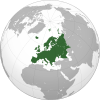Flag of Monaco
 | |
| Use | National flag |
|---|---|
| Proportion | 4:5 |
| Adopted | 4 April 1881 |
| Design | A horizontal bicolour of red and white |
 | |
| Use | State and war flag, state and naval ensign |
| Design | A white field with the coat of arms charged at the center |
 | |
| Use | National flag and civil ensign |
| Design | A white field with red lozenges |


The national flag of Monaco (French: drapeau national de Monaco) has two equal horizontal bands, of red (top) and white (bottom), both of which have been the heraldic colours of the House of Grimaldi since at least 1339. The present bicolour design was adopted on 4 April 1881, under Charles III.
Overview
[edit]Monaco's original flag, which was similar to its current princely flag but bore an older version of its coat of arms, was in use from the principality's early days (except during its annexation to France from 1793 to 1814) until the present, simpler design was adopted in 1881.
Another design (below), the banner of the state arms (lozenges in the Grimaldi family colours, in heraldic terms "lozengy argent and gules"), was used at various times, particularly in the 17th century, as an unofficial flag and still appears in some royal photographs.[clarification needed] However, it has no designated use and does not represent any Monegasque official in particular.
The flag of Monaco is graphically similar to the flag of Indonesia, with differences in their dimension ratios (Monaco's at 4:5 and Indonesia's at 2:3), and the shade of red is darker for the flag of Monaco. The flag of Poland is also similar to that of Monaco, but with the colours reversed – white on top and red on the bottom. The flag of Singapore also has a similar design and colour, with the exception being a crescent with five stars at the upper left side.
Princely flag
[edit]Monaco's princely flag (or government flag) consists of the full achievement of the coat of arms on a white background.[1][2] It is flown at the Prince's palace, government offices, in the presence of government officials, and as an ensign on the Prince's yacht.
Personal standard of Albert II
[edit]
The personal standard of Prince Albert II consists of the Crown of Monaco over two opposing letters A, on a white background. It is only used in his immediate presence, particularly on cars in which he travels. It is often seen with a gold fringe on the top, bottom and right, which is one-ninth the height of the white field.
See also
[edit]Notes
[edit]- Sources disagree as to the flag's usage. According to Flags of the World, it is
 ; according to the World Flag Database, it is
; according to the World Flag Database, it is  ; and according to Whitney Smith's Flags Through the Ages and Across the World (1975), it is
; and according to Whitney Smith's Flags Through the Ages and Across the World (1975), it is  .
.
References
[edit]- ^ "Flags of the World – Monaco". Archived from the original on 22 January 2021. Retrieved 24 March 2005.
- ^ Gouvernement de la Principauté de Monaco
External links
[edit]- Monaco at Flags of the World
- Drapeau monégasque — Gouvernement de Monaco (in French)


 French
French Deutsch
Deutsch
